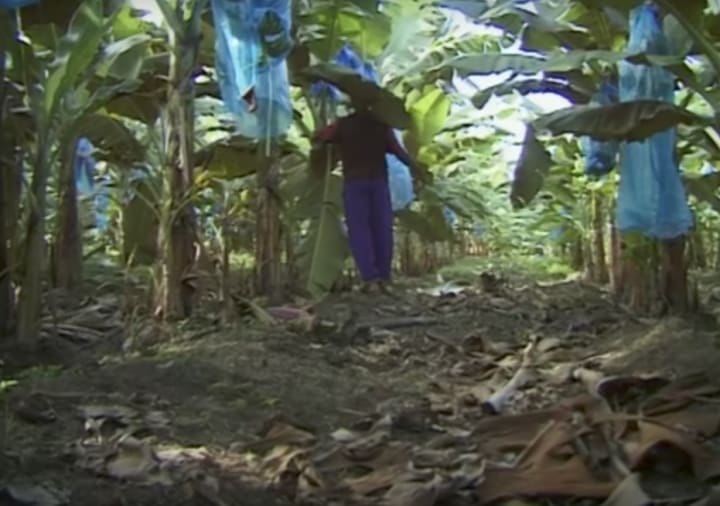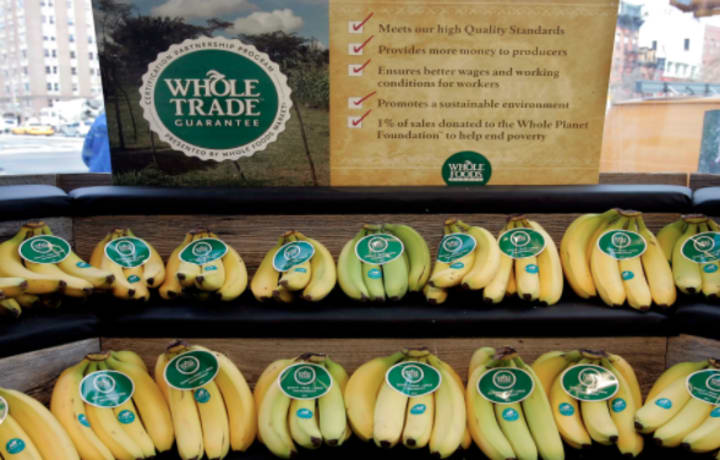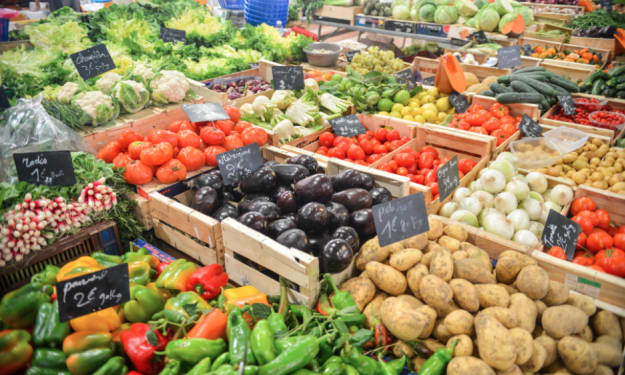Peeling Back the Banana Industry
You won't look at bananas the same way again.

I’ve got beef with the banana industry.
Why? It’s hard to believe that peeling back the familiar yellow facade reveals such a dark and abusive industry. Bananas are the favourite fruit of a number of the world’s developed countries, including — but certainly not limited to — the United States, Britain, and Canada, with 7.1 billion, 2.5 billion, and 3 billion banana consumed annually, respectively, in 2015. With over 107 million tonnes produced per year, bananas comprise a massive industry, one that is highly, highly concentrated in the hands of three major corporations: Dole, Del Monte, and Chiquita.
Could you name another banana brand outside of these so-called "Big 3"? I’ll give you a minute to think. No? That’s okay, neither could I. These three companies dominate the global banana landscape; not only are they extremely lucrative, but they are also very powerful, and as such, they have perpetually abused their position of power and influence. Here’s how.
The Crimes
Let’s start with Chiquita, or, as they were known until 1984, the United Fruit Company. In business since 1899, the United Fruit Company had a long history of operations in Latin America. In the early 1950s, Guatemalan president Jacobo Arbenz Guzman sought to buy the United Fruit Company’s unused land in that country to give to landless peasant farmers. The United Fruit Company approached the U.S. government with claims that Guzman was a communist (at the height of the Cold War), and in 1954, the CIA backed an invasion of Guatemala, called Operation PBSUCCESS, on these grounds. The invasion deposed Guzman, and sparked a forty-year conflict that the Centre for Justice & Accountability says claimed more than 200,000 lives.
Years later, in its current incarnation as Chiquita Bananas, the same company continued to wreak havoc on its farmers and source countries, via the US government. Unlike North America, the European Union sourced its bananas solely from the African, Caribbean, and Pacific countries in which Europe had a colonial past. The Big 3 companies took issue with this preferential treatment, claiming it violated international trade agreements. After a request (and immense pressure) from Chiquita, along with a $500,000 donation to the Democratic Party, the Clinton administration took a complaint against the EU to the World Trade Organization, a case they ultimately won in 1997. The case, which came to be nicknamed "the Banana Wars," was extremely costly for the already wealthy banana companies, yet much of the costs were shouldered by the poor farmers at ground level, while the conglomerations sought to maintain their profits. The Banana Wars also opened the floodgates for further abuses, not only from Chiquita, but from fellow companies Dole and Del Monte as well.
In an attempt to keep their profit line healthy in the wake of the Banana Wars, banana companies instead passed along most of the costs of the WTO dispute resolution to their producers in the developing world. In the late 1990s, the academic journal Latin Trade purports, Dole fired more than 4,000 of its workers, then “rehired them on less attractive contracts” that removed their benefits and bonuses, along with paying less. Dole also generated controversy in 2013 when Oxfam New Zealand broke news of gross mistreatment of workers on its plantations in the Philippines. Oxfam reported “children 15 years old and under working eight to 12 hours a day, harassment of workers for joining a union, aerial pesticide spraying while workers are on plantations (!!), and environmental damage.” What’s worse is that Dole was labelling its products — the very bananas being produced under such circumstances — with stickers reading "the Ethical Choice," and when challenged, even sought to trademark the expression. Del Monte is seemingly the lesser of these three evils, but they are no angels either. In the wake of the Banana Wars, they too engaged in the practice of firing and rehiring workers to cut pay and cut costs. They have also attacked workers for joining unions.
The actions of Dole, Del Monte, and Chiquita have had environmental, social, and health impacts right across the board. Though bananas may be cheap, they come at a huge revenue for the Big 3 (a combined $11.39 billion in 2016, according to Forbes and Fortune 500), and a major cost to the banana farmers of the developing world, who are increasingly taken desperate measures. Particularly in the Caribbean, banana farmers are turning to illegal marijuana growing to supplement their income. The Journeyman Pictures documentary Banana Wars estimates that up to 30% of banana farmers have pursued marijuana growing, where they can earn ten to twenty times their typical banana-growing income. It is only by turning to illegal industry that many of these banana farmers are able to survive, an indicator that the banana industry is in a sad state of affairs.

The Caribbean banana farmers that have been forced to turn to marijuana growing.
Source: Screengrab from Journeyman Pictures' "Banana Wars"
What Can Be Done About It?
Bananas pose a number of major hurdles, particularly for those in the developed world, to get over. Firstly, they’re cheap and affordable, a relative rarity for a nutritious food, and selfishly, it is difficult for consumers to want take any action that could potentially jeopardize this. Secondly, bananas are an exotic fruit, making it extremely difficult to buy local or grow your own, as a way to avoid the industry. So if we want bananas, we’re at the mercy of the supermarket, where Dole, Del Monte, and Chiquita are always in stock (and often signed to long-term contracts with supermarket chains). Companies like Dole and Del Monte offer a "Fair Trade" option, meaning that farmers have been fairly compensated for their products. However, this is highly hypocritical when these same companies are not fairly compensating their producers for the rest of their "non-Fair Trade" products, including other bananas, while simultaneously committing the abuses previously mentioned. And as Raj Patel notes, "Fair Trade" may not always be what the farmers believe is fair, but rather, what they are told is fair by Fair Trade certification bodies, where farmers are underrepresented, and distributors and retailers are dominant.
Your best bet is to seek out ethically-sourced bananas and smaller brands outside of the Big 3. A number of online ethical consumer guides have recommended the following companies: Fyffes and Sainsbury’s in Britain, All Good Organics in New Zealand, and Whole Foods’ Whole Trade Bananas in Canada and the United States. You’ll likely pay a few cents more for these options, and while these days it’s difficult to make your dollar go as far as possible, even as someone on a tight budget I would rather spend a fraction more to know I’m making an ethical choice. I think I can afford a few extra cents here and there to do my small part to combat the abuses of the banana industry. If enough of us do this, then maybe we can start to see a change.

Whole Foods' Whole Trade Bananas.
Source: Whole Foods Market Newsroom
Learn More
If you’re interested in learning more about bananas and the banana industry, there’s a lot of great literature out there…
Harriet Lamb's Fighting the Banana Wars and Other Fair Trade Battles directly addresses these issues, while Cynthia Enloe’s Bananas, Beaches, and Bases and Raj Patel’s Stuffed and Starved, though not entirely devoted to bananas, share great insight into bananas, along with their role in the wider food industry and global landscape
Journeyman Pictures’ documentary Banana Wars provides expository information on the WTO dispute of the same name from the 1990s; watch it here.
Oxfam New Zealand’s report on Dole’s plantations in the Philippines reveals shocking abuses and can be found here.
About the Creator
Logan Carmichael
Political Science grad. Aspiring diplomat.
There's hidden politics behind the food you eat, and I'm here to tell you about it.






Comments
There are no comments for this story
Be the first to respond and start the conversation.